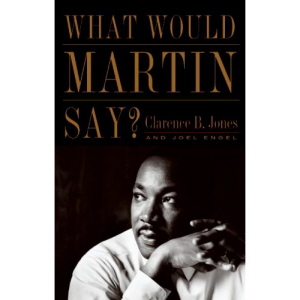April 30, 2008, - 3:13 pm
Martin Luther King’s Lawyer: MLK Liked Jews, Would Have Hated Farrakhan, Sharpton, Jackson
By Debbie Schlussel
Clarence B. Jones was both Martin Luther King, Jr.’s personal attorney and close adviser.
He says that King would have been appalled at the anti-Semitism espoused by many of today’s most prominent Black leaders. He has a book coming out, “What Would Martin Say,” co-written with Joel Engel.
Here are some important excerpts of a great column in today’s Wall Street Journal that was taken from the book and is written by both Jones and Engel (it was not properly credited in the byline). If only this were in the Final Call or even the Michigan Chronicle (a Black Michigan newspaper). Or, more necessary, the newsletter of the Trinity United Church of Christ, Barack Obama’s church:

I can say with absolute certainty that Martin abhorred anti-Semitism in all its forms, including anti-Zionism. “There isn’t anyone in this country more likely to understand our struggle than Jews,” Martin told me. “Whatever progress we’ve made so far as a people, their support has been essential.”
Martin was disheartened that so many blacks could be swayed by Elijah Muhammad’s Nation of Islam and other black separatists, rejecting his message of nonviolence, and grumbling about “Jew landlords” and “Jew interlopers” – even “Jew slave traders.” The resentment and anger displayed toward people who offered so much support for civil rights was then nascent. But it has only festered and grown over four decades. Today, black-Jewish relations have arguably grown worse, not better.
For that, Martin would place fault principally on the shoulders of black leaders such as Louis Farrakhan, Al Sharpton and Jesse Jackson – either for making anti-Semitic statements, inciting anti-Semitism (including violence), or failing to condemn overt anti-Semitism within the black community.
When American cities were burning in the summers before he died, Martin listened to any number of young blacks holding matches blame Jewish landlords or Jewish store-owners in the inner city – no matter that Jews were a minority of landlords and store owners. He asked them, Who else might have bought the buildings that we lived in and rented us apartments? Who else was willing to come in and open stores and sell us the things we needed? Where were these Negroes with money who’d abandoned their communities? And if blacks had bought those businesses and buildings, would they have charged less for rent and bread?
Like I said, too bad this is in the Wall Street Journal, which the audience that most needs to read this isn’t reading.


This article should have been printed in more newspapers.
lonewolf on April 30, 2008 at 3:50 pm